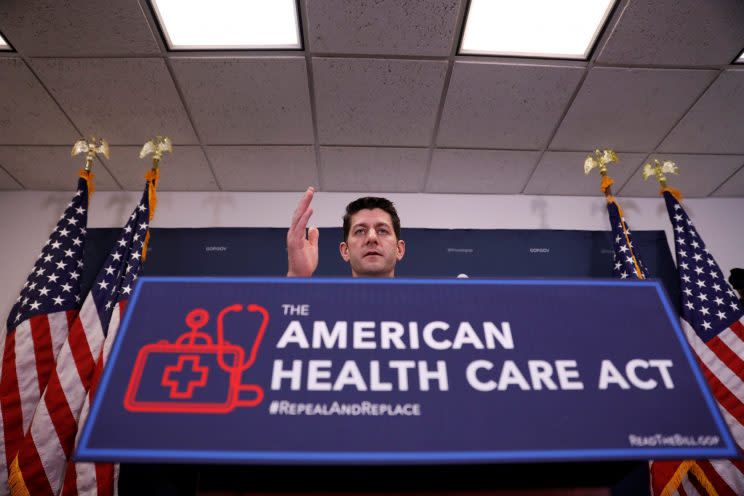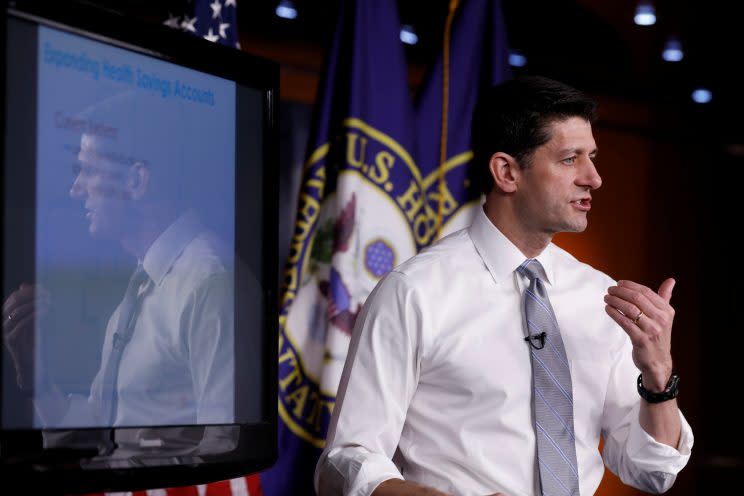Health care fight raises concerns about Paul Ryan’s political skills

WASHINGTON — Paul Ryan’s leadership has long been questioned by Republicans who think he’s politically na?ve, and the current health care fight is raising new concerns about Ryan’s political savvy, as the Republican speaker of the House faces the toughest test of his career.
The Wisconsin Republican has always prioritized ideas and policy details above political strategies, and that’s often been part of his appeal. The latest example: As the GOP health care bill came under fire last week, Ryan held an on-camera briefing with reporters and conducted a half-hour seminar on the details of the legislation.
The effort failed to impress some critics. “Paul’s so earnest. Who thought it was a good idea for him to do a 35-minute Power Point presentation?” scoffed one Republican consultant with years of experience in congressional campaigns.
Ryan’s presentation fell far short of the way vote-counters on the Hill think about getting legislation passed. It takes 218 votes to pass a bill in the House, and lawmakers charged with rounding up support, called whips, take years to hone the skills and mindset needed to count votes and keep members in line.
Former House Speaker John Boehner did not acquire those skills before taking the post of speaker, in contrast to the House majority leader at the time, Eric Cantor. Boehner rose to a leadership position by becoming a committee chairman, where he learned how to build consensus around a set of ideas. Cantor, meanwhile, came up through the whip operation. Some, particularly those who worked for Cantor, considered that Boehner’s lack of experience counting votes made him a less effective speaker.
Like Boehner, Ryan made a name for himself by staking a claim on bold policy ideas, and by chairing first the House Budget Committee and then the Ways and Means Committee, which oversees tax policy. He was the first Republican to propose a detailed plan publicly for sweeping changes to Medicare and Social Security, in 2008, and he was successful in getting the GOP to follow his lead on these issues. His stature was sealed in 2012, when the GOP presidential nominee, Mitt Romney, chose Ryan as his running mate.
But since he became speaker in the fall of 2015 — a job the 47-year old Ryan did not really want — he has ignored suggestions from some Republicans to bring a seasoned political operative or two into his operation, according to one source familiar with the discussions. Ryan’s chief of staff, Jonathan Burks, is a policy expert. His top adviser, Brendan Buck, has spent most of his career on Capitol Hill, and his focus is largely on Congress, rather than developing a long-term or nationalized political strategy, which is what many of the speaker’s allies think he needs. Kevin Seifert, who runs Ryan’s political arm, has spent most of his young career working for Ryan.

But Ryan often spurned making decisions based on political calculations. Rather, he has felt that that if he figures out what he believes is the right thing to do, states it clearly and leads the way forward, others will follow. Ryan learned that lesson after seeing how Boehner and other GOP leaders initially shunned his entitlement reform plan (because it was too politically risky), but then ultimately embraced it. That experience has shaped his leadership style.
Ryan’s lack of guile was evident in his approach to Trump during the Republican primary. He made no secret of his distaste for Trump, unlike Senate Majority Leader Mitch McConnell, R-Ky., who kept a low profile and kept his comments — positive or negative — to a minimum. Ryan adopted a moral stand, essentially saying, after the “Access Hollywood” tape surfaced, that he would not consider supporting Trump. However, he was ultimately pulled into Trump’s orbit by the force of political gravity. In taking a position that he couldn’t maintain, he did damage both to his own image and to his relationship with the incoming president.
Ryan has also never been inclined to crack the whip on recalcitrant House members who defy the priorities of their leadership. He’s not inclined, by temperament, to be confrontational or punitive.
As evidence of Ryan’s political skills, his office pointed to the passage of four budget proposals under his leadership, as well as Trade Promotion Authority, the budget deal he shepherded through Congress in bipartisan fashion with Sen. Patty Murray, D-Wash., in 2013, and legislation last year to avoid a debt crisis in Puerto Rico.
Ryan is well-liked and respected by most Republicans in the House, and has some goodwill among Democrats too. Ryan’s deputies — House Majority Leader Kevin McCarthy, R-Calif., and House Majority Whip Steve Scalise, R-La. — are an effective pair. But on a major effort like the repeal and replacement of President Barack Obama’s health care law, Ryan will have to be just as involved in whipping votes as the rest of his team.
When Democrats passed the Affordable Care Act in 2010, then-Speaker Nancy Pelosi, D-Calif., and Senate Majority Leader Harry Reid, D-Nev., were intimately involved in rounding up support. “They knew the vote counts,” said Faiz Shakir, a former Reid adviser. “When it was a major, put-all-your-chips-on-the-table-moment, they were 100 percent involved, they knew what the vote counts were, were making the calls.”
Tensions with Trump persist and are driving concerns that the president will back away from the current effort and leave Ryan holding the bag. Whether Trump could get away with simply blaming Ryan for a failed effort is an open question, but Breitbart News, a pro-Trump website, published a piece this week clearly laying the groundwork for such a move.
Trump’s top adviser, Steve Bannon, ran Breitbart News until joining the Trump campaign last summer, and his hostility to Ryan is no secret. He often referred to Ryan as “the enemy” during Breitbart conference calls, and discussed his hopes of driving Ryan out of the speakership.
Even without the prospect of a Republican president turning against him, Ryan has never faced a challenge on the scale of the current health care bill. The bill has been attacked by conservatives for too-generous subsidies, by moderates for its cuts to Medicaid, and is now facing increasing criticism from Trump’s allies outside the White House, who are blaming Ryan for the bill’s rocky rollout.
“Trump figures things out pretty quickly, and I think he’s figuring out this situation, how the House Republicans did him a disservice,” Christopher Ruddy, the publisher of Newsmax and a personal friend of Trump’s, told the Washington Post.

Even those who are friendly to Ryan see much that could have been done differently. “There’s some questions about sequencing, timing, preparation, approach that political professionals might say, ‘Ahhh, maybe you should do it this way,’” said one Republican who oversaw a 2016 presidential campaign. “There are a lot of people talking about that, not just in D.C. but in big state governors’ mansions, being like, ‘What the f*** are they doing?’”
Multiple high-level Republican political figures told Yahoo News that the key to passing health care is getting Trump to get fully and publicly behind it, and that the bill should have been presented at the White House, with Trump as the chief salesman, from the beginning.
“The real solution is to say, ‘OK, Mr. President, you’re either going to own this and demand that this goes through, or I’m pulling it,’” said another Republican operative who ran a 2016 presidential campaign. If Trump does not decide to embrace the bill, the Republican said, then Ryan should go back and start over with something more palatable to the right wing, even if that means the bill might pass the House but fail in the Senate.
“If you get into that kind of contest with Trump, I think he’ll blink,” the Republican said.
On Wednesday night in Nashville, Tenn., Trump made supportive comments about the Ryan-led effort. “The House has put forward a plan to repeal and replace Obamacare, based on the principles I outlined in my joint address,” he said.
But his remarks wandered across a number of different topics, and the president has yet to devote the full focus of his rhetorical firepower on pushing the bill toward the finish line.
In a television interview that aired late Wednesday, Trump equivocated when asked if he stands by the details of the health care bill. Fox News’ Tucker Carlson pressed him about a Bloomberg News study that showed that the legislation would benefit counties that voted for the Democratic presidential nominee, Hillary Clinton, more than it would benefit those that voted for Trump.
“We will take care of our people, or I’m not signing it. OK, just so you understand, this is very preliminary,” Trump said of the legislation.
Carlson also questioned whether Ryan was sufficiently loyal. “Are you confident that you share enough in common that … he’s on board with your interests?” Carlson asked Trump.
“I think he is on board with the American people. I do believe that strongly. I think he is on board with my presidency. I think he wants to make it very successful. I like him,” Trump said. “We had our run-ins, as you probably have heard, initially. But I think he is very much — he wants to do the right thing. That I believe 100 percent.”


